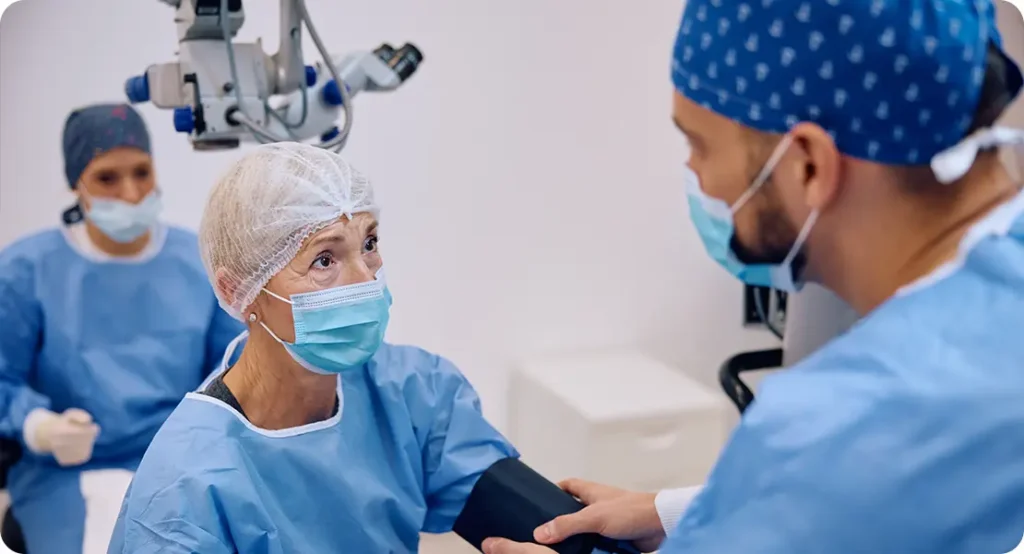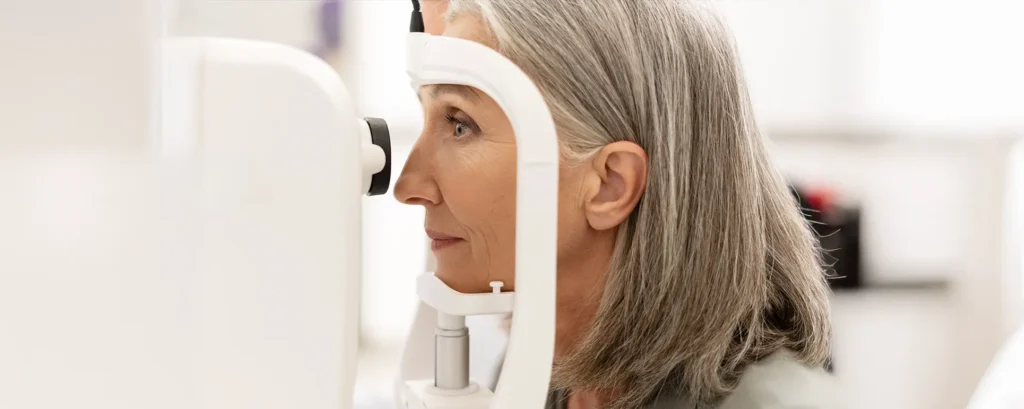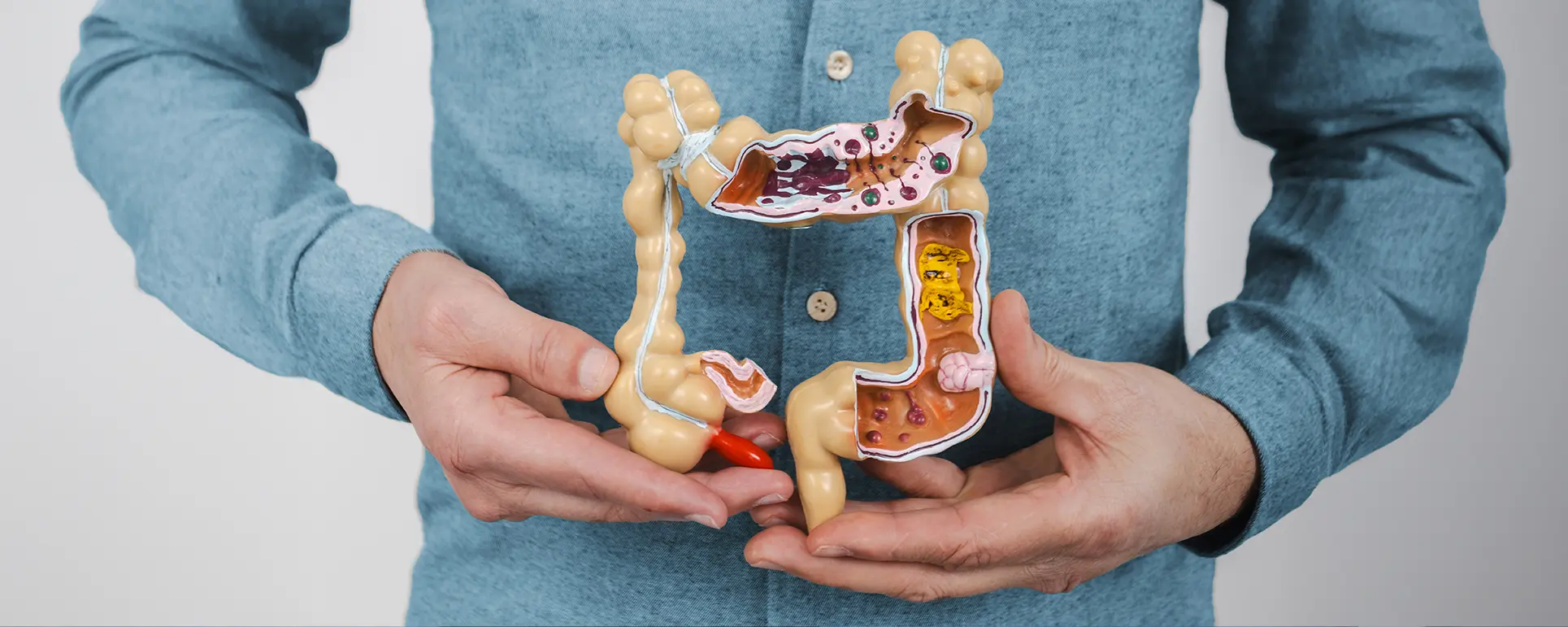If you’ve been living with ulcerative colitis (UC) and are now facing cataract surgery, you might be wondering how these two conditions interact. Can your bowel disease affect your eyes? Will your medications complicate the surgery or your recovery? Should your gastroenterologist and eye surgeon coordinate closely? These are important questions, and in this guide, we’re going to walk you through exactly what to be aware of—so you feel informed and confident every step of the way.
Ulcerative colitis is a long-term condition, and if you’ve been on steroids or immunosuppressants, they can raise your risk of developing cataracts earlier than expected. But the good news is that cataract surgery is generally very safe and effective, even in people with complex medical backgrounds—so long as the right precautions are taken. Let’s break it all down.
Understanding the Link Between Ulcerative Colitis and Cataracts
Steroids and Cataract Formation
If you’ve been treated with corticosteroids—either orally, rectally, or even as eye drops—you’re at a higher risk of developing posterior subcapsular cataracts. This type of cataract forms at the back of the lens and tends to affect reading vision and cause glare in bright light. Steroids alter the metabolism within the lens, leading to the build-up of abnormal proteins that cloud your vision. And it doesn’t take decades—some people start to develop these changes after just a few months of steroid use.
Systemic Inflammation’s Broader Effects
UC isn’t just a bowel issue. It’s an inflammatory condition that can have effects well beyond your gut. Some patients experience extraintestinal manifestations, including in the eyes. Conditions like uveitis (inflammation of the uvea) or episcleritis (inflammation of the eye’s surface) can accompany UC and may indirectly accelerate cataract development or complicate recovery if inflammation flares up after surgery. Keeping your systemic inflammation well-controlled helps reduce the risk of postoperative issues.
The Role of Immunosuppressive Medications
Drugs like azathioprine, methotrexate, or biologics such as infliximab and adalimumab help manage UC by suppressing the immune system. While these medications don’t directly cause cataracts, they may impair your body’s healing response after surgery. That doesn’t mean surgery is unsafe—it just means we need to prepare with extra care, which we’ll cover shortly.
Preoperative Planning: Setting Yourself Up for Success
Talk to Both Your Specialists Early On
This is crucial. Your cataract surgeon needs to know the details of your ulcerative colitis history, especially your current medications, recent flares, or complications like eye inflammation. At the same time, your gastroenterologist needs to weigh in on whether it’s safe to temporarily adjust your medication regime around the time of surgery—particularly if you’re on immunosuppressants or high-dose steroids.
The best approach is often a three-way conversation between you, your eye surgeon, and your gastroenterologist. This ensures everyone’s on the same page and any risks are well-managed before you get to the operating theatre.
Get a Recent Blood Workup
Because UC can affect your nutritional status and immune function, it’s a good idea to check your bloods before surgery. Your surgeon may want to know your white cell count, haemoglobin levels, and CRP (C-reactive protein, an inflammation marker). If you’re anaemic or have signs of active inflammation, the surgical team may delay the procedure until things are under better control.
Review Your Steroid Dose with Care
If you’re currently taking corticosteroids, even at a low maintenance dose, your eye surgeon may need to plan around this. You might need stress-dose steroids on the day of surgery to prevent adrenal insufficiency, especially if you’ve been on long-term steroids. This is something the anaesthetist will also want to know about.
On the Day of Surgery: What You Can Expect

Anaesthetic Considerations
Cataract surgery is typically done under local anaesthesia—usually a numbing injection around the eye or eye drops, with light sedation if needed. If you have a flare of UC that’s affecting your general health, or if you’re on medications that make you immunocompromised, your surgical team may tweak the approach to reduce risk. They’ll also want to take extra care with infection control.
You won’t be put completely to sleep unless there’s a specific reason—like severe anxiety, communication difficulties, or a complex eye anatomy—but you’ll be comfortable throughout.
Minimising Infection Risk
Your immune system may be slightly dampened due to your UC medications, so your team will take every precaution to prevent infection. That usually means using antiseptic eye drops before surgery and possibly prescribing postoperative antibiotics. If you’re at particularly high risk, they may also give antibiotic injections during the procedure.
Expect a Quick Procedure—but a Tailored Recovery Plan
Cataract surgery itself is usually done in under 20 minutes. But your recovery plan may not be one-size-fits-all. For example, you might need a longer course of anti-inflammatory eye drops, or be asked to monitor your vision and eye comfort more closely in the days that follow. Be ready to stay in touch with your surgeon if anything feels off.
Recovery After Cataract Surgery When You Have UC
Healing May Be Slower, but Still Successful
Because of the immune-suppressing nature of many UC treatments, your healing might take a touch longer than average. Don’t worry—that doesn’t mean the surgery hasn’t worked. It just means your body is pacing itself. Your surgeon might schedule more follow-up visits to make sure everything’s going smoothly.
Infection risk is slightly higher, so any signs of redness, discharge, pain, or vision changes should be reported right away. But again, with the right planning, most patients with UC heal just as well as others.
Avoiding UC Flare-Ups During Recovery
The stress of surgery or changes to your usual medications (like stopping NSAIDs or adjusting steroids) can sometimes trigger a UC flare. It’s wise to eat well, stay hydrated, and continue taking your gastroenterologist-approved medications as directed. If you experience abdominal pain, diarrhoea, or bleeding during your recovery period, don’t brush it off—get in touch with your UC team promptly.
Some patients benefit from temporarily increasing their steroid dose after surgery to protect both the gut and the eye, but this should only be done under medical guidance.
Visual Results: What Can You Expect?
Most patients enjoy a significant improvement in vision once the eye has healed—often within a few weeks. If you had a posterior subcapsular cataract, you might notice an immediate reduction in glare and better clarity when reading or watching TV. If your eye was otherwise healthy, your outcome should be comparable to someone without UC.
However, if you’ve previously had UC-related eye inflammation or scarring, your visual recovery might be slightly slower or require additional treatment. This is something your surgeon should prepare you for during the consultation.
Coordinating Long-Term Care After Surgery

Keep Your Eye Surgeon in the Loop
Even after your immediate recovery, it’s a good idea to keep your cataract surgeon informed of any major changes to your UC treatment. For instance, if you switch to a new biologic or have a hospital admission for a flare-up, these can potentially affect your eye health or trigger ocular side effects. Open communication goes a long way.
Ongoing Eye Health Monitoring
People with UC—especially those on long-term steroids—are at increased risk of developing other eye conditions such as glaucoma or macular oedema. After cataract surgery, your eye pressure and retinal health will be checked regularly. Make sure to attend all follow-ups, even if your vision feels fine.
Some UC patients also develop dry eye symptoms, which can become more noticeable after cataract surgery. If your eyes feel gritty, sore, or blurry later in the day, mention this to your ophthalmologist—it’s often easily managed with lubricating drops or anti-inflammatory treatment.
Tips for a Smooth Cataract Surgery Journey with Ulcerative Colitis
- Bring a full list of your medications to all appointments—including biologics, immunosuppressants, and supplements.
- Stay consistent with your UC treatment unless advised otherwise. Stopping medications abruptly can increase both flare risk and surgical complications.
- Consider having surgery during a stable UC period, not during or just after a flare-up.
- Eat and rest well in the days leading up to and after surgery. Your body needs energy to heal.
- Keep a symptom journal after surgery for both your eyes and UC—this helps spot early signs of trouble.
- Ask for written aftercare instructions that account for your specific medical background.
FAQs About Cataract Surgery When You Have Ulcerative Colitis
- Can ulcerative colitis cause cataracts directly?
Ulcerative colitis doesn’t directly cause cataracts, but the medications used to manage the disease—particularly corticosteroids—can increase your risk. These drugs can lead to the formation of a specific type of cataract called posterior subcapsular cataracts, especially if used over a long period. This is why many people with UC may need cataract surgery earlier than those without the condition. - Is it safe to have cataract surgery while on immunosuppressants?
Yes, it is usually safe, but extra precautions need to be taken. Your surgical team may work closely with your gastroenterologist to assess whether your medication should be temporarily adjusted. The main concern is a slightly increased risk of infection or slower healing, but with proper planning, these risks can be effectively managed. - Should I stop my UC medications before cataract surgery?
You should never stop any medication without first speaking to your gastroenterologist. In most cases, it’s safer to continue your ulcerative colitis treatment during cataract surgery to avoid triggering a flare. Your doctor may make small adjustments if necessary, but these will be carefully weighed to balance gut stability with surgical safety. - Will I need a general anaesthetic because I have ulcerative colitis?
Not usually. Most cataract surgeries are done under local anaesthesia with numbing eye drops or an injection around the eye, which is generally well tolerated by UC patients. A general anaesthetic may only be considered if there are special medical reasons, such as severe anxiety or other health complications. - Could cataract surgery cause a flare-up of my UC?
While cataract surgery itself is unlikely to directly cause a flare-up, the stress on your body, changes in medication, or minor infections can potentially trigger symptoms. To reduce this risk, your medical team may take steps like maintaining your steroid dose and monitoring your recovery closely after surgery. - How soon will my vision improve after surgery?
Many people notice better vision within a few days, but if you’re on medications that slow healing, it might take a bit longer. It also depends on whether your eye had other complications, such as previous inflammation. Most UC patients achieve excellent visual results within a few weeks of the operation. - What eye drops will I need after cataract surgery?
You’ll typically be given antibiotic and anti-inflammatory eye drops to use for several weeks. If you’re immunosuppressed, your surgeon might adjust the dosage or duration. It’s important to follow the instructions exactly and attend follow-up appointments to check how your eye is responding to treatment. - Are there any long-term eye risks from UC or its treatment?
Yes, long-term steroid use can increase your risk of glaucoma and macular issues, even after cataract surgery. Ulcerative colitis can also sometimes cause dry eyes or inflammation within the eye itself. Regular eye check-ups are important to catch and treat any of these issues early. - Can cataract surgery affect my other UC medications like biologics?
Cataract surgery doesn’t usually interfere with how your biologics or immunosuppressants work, but timing matters. Your doctors may plan your operation between doses of certain medications to reduce infection risk. Make sure to let your eye team know your treatment schedule well in advance. - Should I choose a particular time for surgery based on my UC status?
Ideally, yes—you should aim to have cataract surgery during a period when your UC is stable and you’re not experiencing a flare-up. This reduces the risk of complications and allows your body to focus on healing. If your condition is unpredictable, your gastroenterologist can help decide the best window for surgery.
Final Thoughts
Having cataract surgery when you have ulcerative colitis requires a bit of extra planning—but the outcome can still be excellent. The key is to work closely with both your eye surgeon and your gastroenterologist, keeping communication open and making thoughtful decisions around timing, medication, and follow-up care.
If you’re considering cataract surgery and want a team experienced in handling complex cases like yours, London Cataract Centre offers highly personalised care tailored to your full medical background. You deserve clear vision—and a plan that supports your health at every level.
References
- Richardson, H., Yoon, G., Moussa, G., Kumar, A. & Harvey, P. (2024). Ocular Manifestations of IBD: Pathophysiology, Epidemiology, and Iatrogenic Associations of Emerging Treatment Strategies. Biomedicines, 12(12), 2856.
Available at: https://www.mdpi.com/2227-9059/12/12/2856 - Mady, R., Grover, W. & Butrus, S. (2015). Ocular complications of inflammatory bowel disease. The Scientific World Journal, 2015, Article ID 438402.
Available at: https://www.ncbi.nlm.nih.gov/pmc/articles/PMC9781961/ - Mintz, R., Feller, E.R., Bahr, R.L. & Shah, S.A. (2004). Ocular manifestations of inflammatory bowel disease. Inflammatory Bowel Diseases, 10(2), pp. 135–139.
Available at: https://pubmed.ncbi.nlm.nih.gov/15007127/ (wjgnet.com) - Cuny, A., Guillo, L., Baumann, C., Netter, P., Danese, S., Caron, B., Peyrin‑Biroulet, L. & Angioi, K. (2022). Ocular Manifestations in Patients with Inflammatory Bowel Disease in the Biologics Era. Journal of Clinical Medicine, 11(15), 4538.
Available at: https://www.ncbi.nlm.nih.gov/pmc/articles/PMC9781961/ - Belair, M. et al. (2023). Ophthalmic complications in inflammatory bowel disease: Keep an Eye on It. [Cells journal preprint]. Provides insights into episcleritis, uveitis, and other extra-intestinal eye manifestations.
Available at: https://www.researchgate.net/publication/377368142_Ophthalmological_Manifestations_in_Inflammatory_Bowel_Diseases_Keep_an_Eye_on_It

